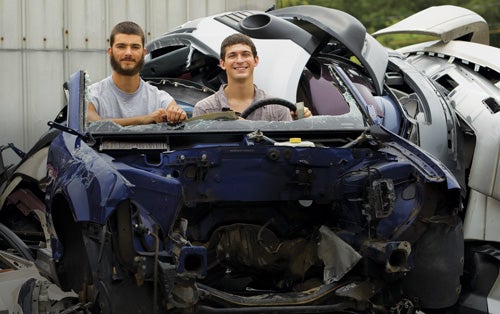The Business of Dumpster Diving

“I don’t see why our society can’t attain an 80 to 90 percent recycling rate, and that is what our business is trying to achieve.” – Cory Harrigan
A recent graduate and a URI senior have launched a recycling company that is already saving local automotive companies hundreds of dollars in recycling costs each month.
Dylan Gregory ’12 (right) and Cory Harrigan, class of 2013, call their Narragansett-based company Scrap Specialists Recycling. The pair invested their own money to purchase 12 dumpsters of various sizes and contracted with several vendors who pay them for the recyclables they collect.
“We both had a pre-existing passion for environmental issues, and when we took a class on energy economics, we saw that there was a lot of opportunity for energy savings through recycling,” Gregory said. “Recycling is something that needs to be done, and people shouldn’t be charged to do it.”
“Recycling is a basic form of sustainability, and in my eyes it’s common sense,” added Harrigan. “I don’t see why our society can’t attain an 80 to 90 percent recycling rate, and that is what our business is trying to achieve. I find it fascinating how objects that are considered waste can be turned into entirely different goods that are totally unrecognizable from their original form and that can be reused in endless applications.”
Beginning in the fall of 2011, Gregory and Harrigan tested the waters by partnering with Crown Collision, a successful auto body business with offices in three locations in Rhode Island. The students dropped off a dumpster at each location and instructed company personnel to toss in all of their recyclables—paper, boxes, plastics, auto parts, and scrap metal. When the dumpster is full, the pair remove, sort, and bail the materials, and the vendors haul the bails away.
“Crown Collision previously had to pay a monthly fee for dumpsters as well as a tipping fee each time the dumpsters had to be emptied, but now we have our dumpsters there, empty them as needed, and don’t charge them anything,” said Gregory. “They’re saving $200 to $400 per month per location, and we make our money by selling the recyclable materials.”
The success of their first efforts led them to solicit other automotive companies. “We see great potential with the automotive industry,” Gregory said. “As far as I know, we’re the only company targeting them, and the only ones handling all the recyclables in one container at no cost to them.”
The company had half-a-dozen customers last spring when their venture received some local publicity in several Rhode Island news outlets, and now their customer count has doubled. So far, all of their revenues are being invested back into the business to purchase additional dumpsters.
“Once we get 30 or 40 customers, we’ll have more capital to work with and be able to pay ourselves a little something,” said Gregory.
“The entire process of starting a business has been a real challenge,” noted Harrigan, “whether it’s thinking about the next step to grow the business or writing emails and answering questions from potential customers. But I found that as long as you put all that you’ve got into something, something positive will result and the road to success will come together.”
Harrigan spent last spring studying abroad in New Zealand, where he found new ideas and different ways of thinking about recycling. He believes that the United States should adopt New Zealand’s recycling system, which he claims is quite simple and convenient and one that can provide an economic boost to the country.
“Being away from Dylan and Scrap Specialists for the semester made me even more ambitious and hungry for success,” he said. “I’m ready to tackle some new ideas that have been floating around in my head for some time, and my time in New Zealand has only helped me focus on what is next.”
The composting of food waste is one subject that Harrigan found promising in New Zealand, so Gregory has taken that idea to local farmers in Rhode Island, and together they are exploring how best to launch a local food composting initiative in the URI dining halls.
The company is a labor of love for Gregory and Harrigan, and they hope it will eventually turn into full-time jobs for both of them.
“I hope that through our business we can find new ways to recycle material into usable products and in turn spread this knowledge so it can be utilized,” Harrigan said of the company’s future. “I’m not one to set strict goals and try to predict the future. I simply know that the possibilities with Scrap Specialists are endless, and many more influential and exciting things will result from our passion and ambition for solving environmental problems.”
Gregory put it in slightly simpler terms. “I love getting in the dumpster and sorting recyclables,” he said. “I absolutely love what I do.”
By Todd McLeish
For more information, contact Gregory at 401.429.3247 or Dylan@scrapspecialists.com.
 Home
Home Browse
Browse Close
Close Events
Events Maps
Maps Email
Email Brightspace
Brightspace eCampus
eCampus


